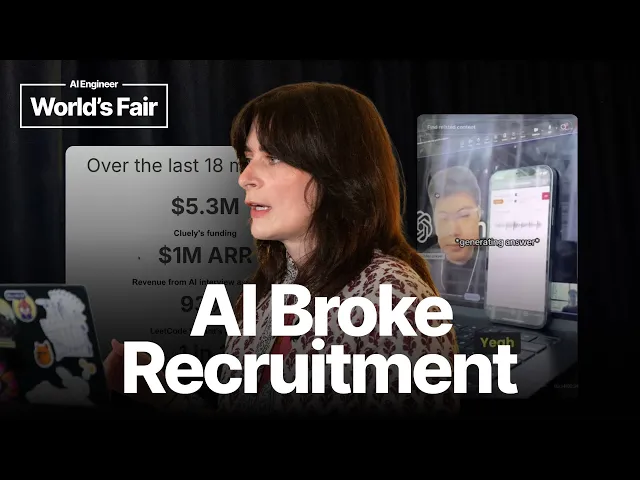How to Hire AI Engineers when EVERYONE is cheating with AI

AI hiring deception: what's really happening
In a landscape where artificial intelligence skills are at a premium, organizations are facing an unexpected challenge: determining who genuinely possesses AI expertise versus who's merely leveraging AI tools to fake competence. Beth Glenfield, speaking at DevDay, offers a refreshing perspective on this growing phenomenon. Her insights reveal a complex reality where technical assessment processes need urgent recalibration to identify authentic talent in an increasingly AI-augmented world.
Key insights from Glenfield's presentation
-
Traditional technical assessments have become fundamentally broken as candidates increasingly use AI to generate code, complete take-home challenges, and even "ghost-solve" problems during live interviews.
-
The most successful hiring processes now incorporate multidimensional evaluations that test not just coding ability, but problem decomposition, edge case identification, and implementation skills that AI tools still struggle to replicate.
-
Organizations should focus on evaluating how candidates think about problems rather than simply what they produce, with special attention to their understanding of model limitations and trade-offs.
The authenticity crisis in technical hiring
The most compelling aspect of Glenfield's talk is her observation that we're witnessing an "authenticity crisis" in technical hiring. This isn't merely about candidates being dishonest—it's about the blurring lines between human and AI-generated work, creating fundamental challenges for identifying true expertise.
What makes this particularly significant is the broader context: as AI tools become ubiquitous in professional settings, the ability to distinguish between AI-assisted work and genuine understanding becomes crucial not just for hiring decisions but for organizational success. Companies that fail to develop this discernment risk building teams with surface-level capabilities rather than deep expertise—a distinction that becomes painfully apparent when facing novel, complex challenges.
Beyond the video: navigating the AI-human collaboration continuum
What Glenfield's talk doesn't fully explore is the spectrum of AI-human collaboration that's rapidly evolving. Organizations need to recognize that we're moving toward a future where the question isn't binary (human OR AI) but rather about the effectiveness of the human+AI combination.
Consider Shopify's engineering team, which recently updated their assessment process to explicitly allow AI tool usage—but with a critical twist. Candidates must explain their prompting strategy, defend their choices
Recent Videos
How To Earn MONEY With Images (No Bullsh*t)
Smart earnings from your image collection In today's digital economy, passive income streams have become increasingly accessible to creators with various skill sets. A recent YouTube video cuts through the hype to explore legitimate ways photographers, designers, and even casual smartphone users can monetize their image collections. The strategies outlined don't rely on unrealistic promises or complicated schemes—instead, they focus on established marketplaces with proven revenue potential for image creators. Key Points Stock photography platforms like Shutterstock, Adobe Stock, and Getty Images remain viable income sources when you understand their specific requirements and optimize your submissions accordingly. Specialized marketplaces focusing...
Oct 3, 2025New SHAPE SHIFTING AI Robot Is Freaking People Out
Liquid robots will change everything In the quiet labs of Carnegie Mellon University, scientists have created something that feels plucked from science fiction—a magnetic slime robot that can transform between liquid and solid states, slipping through tight spaces before reassembling on the other side. This technology, showcased in a recent YouTube video, represents a significant leap beyond traditional robotics into a realm where machines mimic not just animal movements, but their fundamental physical properties. While the internet might be buzzing with dystopian concerns about "shape-shifting terminators," the reality offers far more promising applications that could revolutionize medicine, rescue operations, and...
Oct 3, 2025How To Do Homeless AI Tiktok Trend (Tiktok Homeless AI Tutorial)
AI homeless trend raises ethical concerns In an era where social media trends evolve faster than we can comprehend them, TikTok's "homeless AI" trend has sparked both creative engagement and serious ethical questions. The trend, which involves using AI to transform ordinary photos into images depicting homelessness, has rapidly gained traction across the platform, with creators eagerly jumping on board to showcase their digital transformations. While the technical process is relatively straightforward, the implications of digitally "becoming homeless" for entertainment deserve careful consideration. The video tutorial provides a step-by-step guide on creating these AI-generated images, explaining how users can transform...
